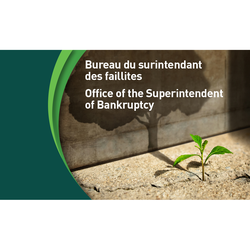
Closed
Find a Licensed Insolvency Trustee
Last Update: October 27, 2025
Canada
Advice and options for dealing with unmanageable debt
Other Support
Expert Advice
At a glance
Funding available
Financing goals
No objectives are currently available
Eligible Funding
- No Condition
Timeline
- Open Date : July 1, 2024
- Closing date : December 31, 2024
Eligible candidates
Eligible Industries
- Finance and insurance
- Professional, scientific and technical services
- Administrative and support, waste management and remediation services
Location
- Canada
Legal structures
- For-profit business
- Sole proprietorship
Annual revenue
- All revenue ranges
Organisation size
- All organization sizes
Audience
- All groups
Overview
Connect with a federally licensed professional who can help you restructure your business, file a proposal, or file for bankruptcy.
Activities funded
Examples of admissible projects:
$ 95,000
Support restructuring of a for-profit company with non-resident office expenditures
$ 85,000
Restructure a non-profit organization by optimizing head office and office expenses
$ 104,000
Restructure general partnership by covering head office and business office expenses
$ 120,000
Restructuring financial cooperative with new resident office and head office costs
$ 90,000
Facilitate restructuring of a social economy enterprise by covering head office and resident expenses
$ 72,000
Support for sole proprietorship undergoing restructuring, including office and head office expenses
Eligibility
**Eligibility Criteria for this grant:**
- Applicants must be Canadian citizens or permanent residents.
- Businesses must be registered and operating in Canada.
- Applicants must meet the specified financial thresholds.
Who is eligible?
Eligible applicants for this grant are active Licensed Insolvency Trustees (LITs) in Canada who provide advice and services to individuals and businesses facing debt challenges. These professionals are federally regulated and must be actively practicing, which includes being able to file professional engagements either individually or through a corporate trustee affiliation.Who is not eligible
This grant provides information about Licensed Insolvency Trustees and does not give specific details about ineligible companies or industries. Without specific restrictions listed, we cannot determine who cannot apply for this grant.
Eligible expenses
Eligible expenses for this grant may include:
- Business office expenses
- Resident office costs
- Non-resident office expenses by appointment
- Head office expenditures
Selection criteria
The evaluation and selection criteria for this grant include financial need, project feasibility, and adherence to program guidelines. Applicants will be assessed based on their ability to demonstrate these criteria effectively.
- Financial need
- Project feasibility
- Adherence to program guidelines
How to apply
1
Determine your eligibility for the grant by reviewing the specific criteria and requirements outlined by the grant provider.
2
Prepare all necessary documentation and information required for the application process.
3
Complete the grant application form accurately and thoroughly.
4
Submit the application within the specified deadline, ensuring all details are correct and all supporting documents are included.
5
Await notification from the grant provider regarding the status of your application.
Additional information
Here are additional relevant details for Licensed Insolvency Trustees:
- Licensed Insolvency Trustees are federally regulated professionals that can provide advice and services to manage debt problems effectively.
- An LIT may either file professional engagements under their personal name or represent a corporate trustee.
- There are different office types where LITs can operate, such as business offices, resident offices, non-resident offices, and head offices.
- The operational status of LITs can vary, with some being actively practicing, semi-active, or inactive, affecting their engagement capabilities.
- LITs can register BIA Insolvency Counsellors, who are then accountable to the LIT for specific insolvency cases.
- It provides a comprehensive directory to find Licensed Insolvency Trustees by name or location.
- LITs fulfill their duties under specific regulatory frameworks and directives to serve both corporate and consumer insolvency needs.
Contacts
416-645-6500
Canada
Apply to this program
Frequently Asked Questions about the Find a Licensed Insolvency Trustee Program
Here are answers to the most common questions about the Find a Licensed Insolvency Trustee. This section explains what the program is, how much funding is available, eligibility requirements, application deadlines, and other important details to help you determine if this grant is right for your business.
What is the Find a Licensed Insolvency Trustee?
What is the deadline to apply?
Who is eligible for the Find a Licensed Insolvency Trustee program?
Who can I contact for more information about the Find a Licensed Insolvency Trustee?
Where is the Find a Licensed Insolvency Trustee available?
Is the Find a Licensed Insolvency Trustee a grant, loan, or tax credit?
Who are the financial supporters of the Find a Licensed Insolvency Trustee?
Apply to this program
More programs like this

Grant and FundingClosed
Industrial Research Assistance Program (IRAP) – AI Assist
National Research Council Canada (NRC)Supports Canadian SMEs in adopting and integrating advanced AI solutions

Wage Subsidies And InternsOpen
Industrial Research Assistance Program (IRAP) — Youth Employment Program (YEP)
National Research Council Canada (NRC)Money to hire a student

Researchers And FacilitiesPartnering and CollaborationWage Subsidies And InternsOpen
Mitacs Accelerate
MitacsConnect organizations with academia for research and innovation collaboration

Grant and FundingClosed
ISED — Artificial intelligence (AI)
Innovation, Science and Economic Development Canada (ISED)Supports testing innovative AI prototypes for Canadian government needs

Grant and FundingOpen
Global Innovation Clusters
Innovation CanadaFinancial assistance to work in collaboration on innovation projects

Grant and FundingOpen
IP for Business
Canadian Intellectual Property Office (CIPO)Intellectual property training, tools and expertise

Wage Subsidies And InternsOpen
ECO Canada — Student Work Placement Program
ECO CanadaMoney to hire students for an environmental co-op

Grant and FundingClosed
Enhanced Road Safety Transfer Payment Program (ERSTPP)
Transport CanadaFunds projects to enhance road safety and reduce traffic injuries

Researchers And FacilitiesExpert AdviceOpen
Digital and Quantum Innovation Platform — PINQ²
Plateforme d'Innovation Numérique et QuantiqueGet expert advice and the use of a high-tech environment

Grant and FundingClosed
Canada Nature Fund for Aquatic Species at Risk (CNFASAR)
Fisheries and Oceans Canada (DFO)Supports recovery and protection of aquatic species at risk
Sign up to our platform to access the Find a Licensed Insolvency Trustee information sheet for free
Get access to 4,000+ programs, practical guides, personalized alerts, and an AI assistant to support your grant applications.